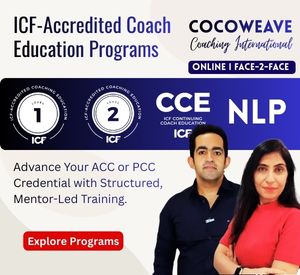Coaching supervision is a reflective process designed to enhance the competence of coaches and to ensure we are fit for purpose. Supervision has three main functions: normative (exploring ethical challenges), developmental (supporting coaches in improving their practice), and supportive (promoting personal well-being). Group coaching supervision, a form of supervision that involves a group of coaches working together with a trained supervisor, offers a platform for reflection on their coaching practice, learning from each other, and receiving feedback and support. In this blog, we will explore the benefits, challenges, and strategies of group coaching supervision. Both authors have facilitated global coaching supervision groups for over a decade, catering to both internal and external coaches.
Benefits of Group Coaching Supervision
Peer Learning: Group coaching supervision offers an opportunity for coaches to learn from each other and build a small community in a profession that can be lonely. Coaches can share experiences, insights, and challenges, gaining perspectives and approaches from others. This can help broaden their perspectives, develop new skills, normalize experiences, and improve their coaching practice. The trained supervisor holds the space, works systemically, and uses psychodynamic tools to support the reflection space.
Feedback and Support: Coaches receive constructive feedback and support from their peers and the coaching supervisor in group coaching supervision. This can help coaches identify strengths, find development opportunities, enhance coaching skills, build confidence, and ensure self-care.
Cost-Effective: Group coaching supervision is often more cost-effective than individual supervision as coaches can share the supervision group cost, which makes it more affordable.
Demonstration of Ethical Practice: Many organizations, especially in Europe, require coaches to engage in active supervision. Coaches often are asked to have their supervisors sign off on active supervision. This ensures that the coaches hired have someone to talk through any arising issues. Participation in a supervision group can satisfy this requirement.
Systemic Lens: There are many complex issues in our world, and working with a coaching supervisor supports coaches to take a more systemic approach to supporting their clients. The group format ensures more voices from the system are represented.
Challenges of Group Coaching Supervision
Group Dynamics: Group coaching supervision can be challenging due to group dynamics and differences in coaching styles, personalities, cultural nuances, and perspectives. These can lead to conflicts, misunderstandings, or a lack of trust and often to ruptures in the group. A skilled coaching supervisor with facilitation expertise and an understanding of group dynamics is essential.
Time Management: Effective time management is crucial to ensure all participants have the opportunity to share their experiences. This becomes challenging when there are many participants or when some are more vocal than others, or due to cultural differences that hinder participation.
Vulnerability: Some coaches may find it challenging to open up in supervision, particularly when in a group setting, where issues of shame may hinder participation.
Ethical Concerns: Maintaining confidentiality is essential in coaching supervision to ensure that coaches can share their experiences and challenges openly without fear of judgment or repercussions. However, confidentiality becomes more complex in a group setting where participants may know each other or work in the same organization.
Examples of Topics and Cases Shared in Group Coaching Supervision:
“I pass my client’s supervisor in the hall regularly, and she often asks me how the coaching is going. I’m not sure what to say.”
“I am coaching two clients – one reports to the other – and I am finding that it is hard to hold the confidentiality of each client.”
“I am triggered by one of my clients who talks on and on, and I feel that I need to interrupt so that I can add value.”
“One of my clients has asked me to stay with their family when I am visiting their town. I’m not sure if that is okay.”
“I feel that I am crossing the line into a friendship with one of my clients.”
“We work together as team coaches, and we seem to be having some power dynamics that we need to untangle.”
Strategies for Effective Group Coaching Supervision
Build Psychological Safety: Spend time contracting not only logistics but also expectations (psychological contract), establishing clear ways of working that include confidentiality, respect, support, and active listening. This can help create a safe and supportive environment for coaches to share their experiences and challenges openly. There may be some power, rank, and privilege aspects within the group that might need to be surfaced and discussed.
Preparation: Encourage coaches to prepare for group coaching supervision by reflecting on their coaching practice, identifying challenges, and setting session goals. This helps maximize the session’s value and ensure individual needs are met.
Regular Feedback: Coaches should provide feedback to each other and the facilitator/supervisor on the effectiveness of the session, the facilitation, and the group dynamics. This can help improve the quality of the supervision and ensure that all participant needs are met.
Supervisor’s Responsibility: Supervisors should engage in their own supervision of supervision to ensure ethical conduct in working with coaches and modeling the way. It is important to work with a coaching supervisor experienced in group dynamics.
Conclusion
Group coaching supervision is an effective way for coaches to enhance their coaching practice, manage ethical challenges, and support their personal and professional development. While challenges exist, establishing clear ways of working, effective facilitation, and regular feedback empower coaches to make the most out of their group coaching supervision sessions and improve their coaching practice in service to their clients and the wider system.
Damian Goldvarg, ACTC, MCC, PhD, and Lily Seto, PCC, MA, will be exploring this topic more in depth at ICF Converge 2023, which is taking place August 23-26 in Orlando, Florida, USA. Join their workshop session “Experience the Magic of Group Coaching Supervision” in the Learn theme on Saturday, August 26 at 9 a.m. (local conference time). By attending this session, you can earn 0.75 Continuing Coach Education units in Core Competency and 0.75 in Resource Development.
Disclaimer
The views and opinions expressed in guest posts featured on this blog are those of the author and do not necessarily reflect the opinions and views of the International Coach Federation (ICF). The publication of a guest post on the ICF Blog does not equate to an ICF endorsement or guarantee of the products or services provided by the author.
Additionally, for the purpose of full disclosure and as a disclaimer of liability, this content was possibly generated using the assistance of an AI program. Its contents, either in whole or in part, have been reviewed and revised by a human. Nevertheless, the reader/user is responsible for verifying the information presented and should not rely upon this article or post as providing any specific professional advice or counsel. Its contents are provided “as is,” and ICF makes no representations or warranties as to its accuracy or completeness and to the fullest extent permitted by applicable law specifically disclaims any and all liability for any damages or injuries resulting from use of or reliance thereupon.
Post Type
Blog
Audience Type
Coach Educators, Experienced Coaches, External Coaches, ICF Chapter Leaders, Internal Coaches, New Coaches, Professional Coaches, Team and Group Coaches
Topic
Coaching Toolbox, Discover - Your Coaching Career
Related Posts
The Power of Active Listening in Meaningful Coaching: Why Active Listening is the Most Essential Coaching Competency
Of all the foundational coaching competencies identified by the International Coaching Federation…
Allyship in Action: Coaching as a Catalyst for Change
Allyship is often framed as a value or an intention. In practice,…
Grace Under Fire: Building Stress Resilience for Coaches and High Achievers
There’s a unique kind of pressure that lives at the intersection of…








